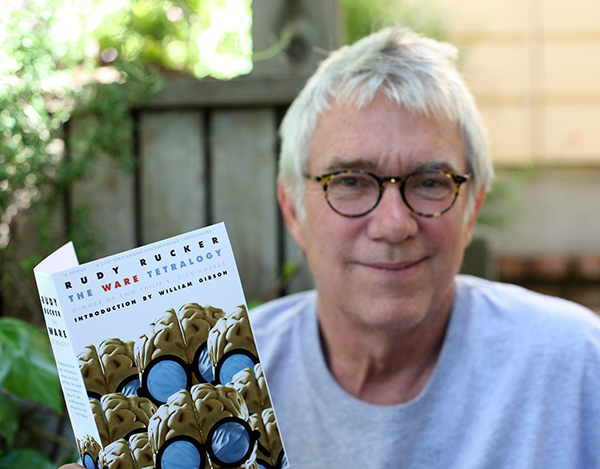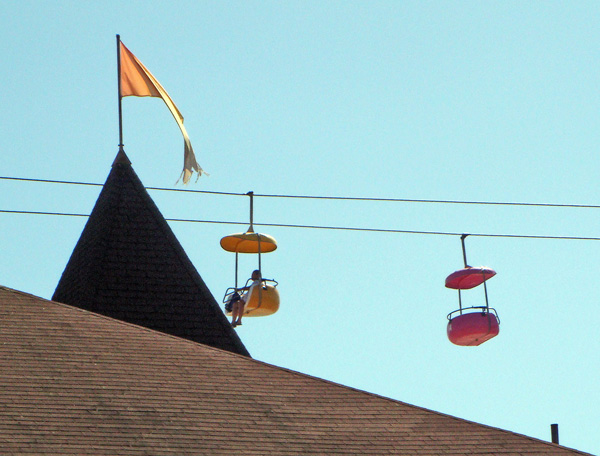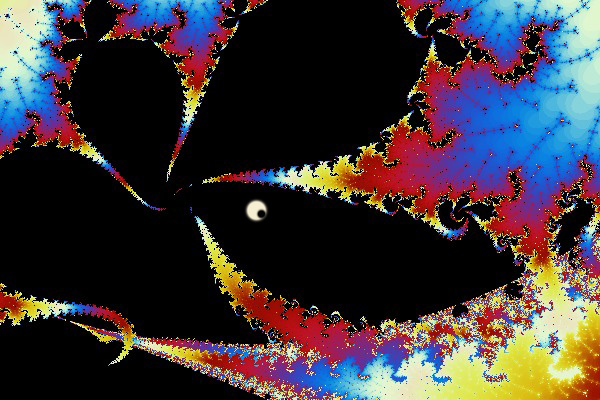I finished the proofing on The Ware Tetralogy, and got a preprint of the cover.

The four Ware novels had been scanned from the old paperbacks by bookz-pirates, and I had to correct a number of typos that had crept in. Being a writer, I can’t reread something of mine without seeing things to fix, so I made a few small tweaks as well—making the novels consistent from one to the next, and smoothing the flow.
It looks good, and should be out in June. Go ahead and pre-order a copy now! It was interesting for me to go over those old books again—some of it has this great wild and mad energy of a young writer.
Oh, and I should mention that my most recent novel Hylozoic is out in paperback and all e-book formats now.
My friend Leon Marvell just sent me a tape of a talk I gave at the University of Melbourne on November 24, 2009. The topic is, “My Life as a Writer.” It’s about forty minutes long, with ten minutes of Q&A. I put it up as a podcast; click on the icon below to access the podcast via Rudy Rucker Podcasts.
I’m working on a couple or three stories these days, hoping to do some of them as collaborations with other SF writers. I’m also working on a big painting inspired by Terry Bisson’s amazing anthology, Billy’s Book. Terry is some kind of master.

I just finished reading Cory Doctorow’s cool new novel Makers which, by Cory’s usual policy, you can also download for free at his site. It’s an epic-length story about two guys using 3D printers to make smart knick-knacks and ghost-house-type amusement park rides.
An unusual thing about the book is how much of it is about standard and alternate ways of organizing large businesses, with many conversations about law suits and legal stratagems. A more typical SF writer would run with the self-reproduction aspect of 3D printers, push on into biotech “printers,” or expand upon Cory’s exploration of what kinds of gadgeteering the ubiquitous 3D printers might bring about. But, perhaps because of his time working with the Electronic Freedom Foundation, and because of his years-long agit-prop against commercial ebooks with digital-rights-management systems, Cory loves spinning out variations on scenarios involving intellectual property rights.

I enjoyed the book’s manic, off-kilter pace. I liked the tinkering, and I rooted for the characters. But, as an aside, I have to say that I no longer feel a great enthusiasm for Cory’s ideas about giving away one’s personal intellectual property. I raise this point because one of his characters, Perry, is very committed to such principles, to the point of walking away from seemingly good deals.
But I do like the way the Cory’s essays and novels are opening up the range of possibilities that we can easily envision. And I love the whole do-it-yourself ethos. My own impossible dream on this front is that we might find a way to realize a simulacrum of Ted Nelson’s notion of having there be in some sense only one electronic copy of, say, a novel. And everyone would be reading that one copy, and we could easily charge admission, like the owner of a living, breathing two-headed calf in a sideshow tent. And you could keep the tent right in your own back yard.

[Mickey Rat, the anti-Disney icon, was spotted today inside the quadratic Rudy set fractal!]
[Going off on a tangent for a moment…on the writing front, looking ahead ten or twenty years, it seems possible that a writer’s main market outlet (especially for back-list books) will be electronic books of some kind. Not that this is a sure thing. Maybe paper really will have the lion’s share forever. But at this point, the the notion of giving away your electronic books free is starting to seem illogical for a writer who wants to make a few bucks off his or her work in the future. Yes, if you’re personable enough, you may be able play off your renown to get paying gigs as a speaker or a consultant. But many of us don’t want to go out and consult or make appearances. That’s a whole other job. For some of us, going on the road and meeting people is too much work. We’d like to stay home and write, with the expectation that a steady trickle of money will flow in for as long as people read our writing and take the road of buying non-pirated electronic editions. Like with music. And, yes, I’m conflicted and confused about this. We writers do love to be read, even if we have to give our stuff away.]

Back to Makers . It’s striking how much of the novel is about Disney and about amusement park rides. I’d kind of thought Cory got this out of his system with Down and Out in the Magic Kingdom. But he has this really deep obsession with Disney—when I saw him at WorldCon in LA a couple of years ago, he mentioned that, while living in LA, he’d gone to Anaheim Disneyland and it’s associated venues an exceedingly large number of times. Although he resents the authoritarian, closed-standards aspects of the corporation, he does love the rides and the alternate realities.
When a writer returns to a certain theme over and over again, it’s tempting to try and find a deeper, subtextual meaning for the theme. I myself was obsessed with amusement park rides as a boy—for me it was all about the midway at the annual Kentucky State Fair in Louisville. And I still love going to the Boardwalk in Santa Cruz. I do remember being pleasantly surprised when I finally made it to a Disney park when I was about thirty, I was thinking, “This is the Waterford crystal of plastic.” It’s not the same as the Old Weird America carnival and pay-by-the-ride parks. But their big budget does bring some nice frills. The sincere-vs.-lavish is one of things that Cory is getting at in Makers.
What does a ride stand for? What does it signify?

One simple idea is that a ride is as symbol for a story. People often refer to stories or novels as “wild rides.” You strap yourself in and go clickety-clacking off into the darkness of an author’s mind. Cory knows this, and he makes the connection quite explicit in Makers.
The main characters have set up a ride in a big abandoned building where you kind of drive around in little electric cars and look at exhibits. It’s like, as I say, the old ghost-house rides or maybe a little like the “It’s a Small World” ride. But you can steer your car to some extent. The ride isn’t about gravity or acceleration like a roller-coaster, it’s about looking at little scenes. Very much like a novel.

In Cory’s vision of a futuristic ride/novel, the users are continually changing the scenes. His final ride is like a physical wiki, indeed the ride is instantiated at multiple sites across the world, and the changes that the users make on any given site can be percolated out through the network to change all the other rides to match—taking advantage of those handy 3D printers and maintenance robots.
And the “story” sketched out by ever-mutating scenes of the final ride is one that’s emerged from the minds of all the users, acting in concert like an ant colony. This is a cool SF trope and I’d like to see it pushed further. In reality, I guess there must be some wiki-written fiction on the web, but I’m guessing it isn’t be very good—but maybe? Post a comment with a link to further-reading wikifiction links if know of any.
In some sense, film scripts are wiki-written, in that they have so very many inputs—but of course that’s in some sense the reason why most film scripts suck. To a mild extent, when you co-author a story with another writer, you’re getting into the emergent story zone. I recall that some of us tried writing a wiki-style story using Google Docs, and posted it as “Irene Leaves the Werehouse” on Flurb, but it has that disjointed feel of the classic dada/surreal “Exquisite Corpse” pictures.

Oh, here’s a flash: the so-called “news stories” that society presents us with are wiki-written fiction. News is the fiction that a society writes.
Cory’s got me thinking!









May 31st, 2010 at 4:39 pm
Neal Stephenson, Greg Bear and some others are apparently trying something along those lines, re wiki-ficition. Here is a description.
June 1st, 2010 at 5:14 am
Rudy,
I’m a writer and a library employee. I’ve become a fan of your works through reading the copies the library has. I’m also a fan of Doctorow’s (among many other SF authors) and came across his work in the same way. I share some of your reservations about “giving it all away for free” and yet I haven’t paid for any of your work or his, though I do buy books, new and used. I’ve also gotten some family and friends to read both Cory’s books and your own. In my own writing world, I guess I’m still an amateur because I have yet to get a check for anything I’ve written, though I’ve been published in a few underground magazines, small presses etc., and write music reviews regularly for Brainwashed.com. I’m still working at fulifilling my childhood dream of becoming a pro SF writer. On the one hand I I feel inspired by Cory’s example and sometimes think I should put more of my pieces out their for free. On the other hand it would be nice to be compensated for all of the effort that is put into a piece. And I don’t have all the readers of Boingboing behind me. As a writer whose day job is slinging books at the public Library I wonder what your views are on this form of having your work shared, and other related thoughts.
June 1st, 2010 at 7:03 am
Justin, I read library books myself. In fact, the MAKERS that I read was from the library. Given how much time I spend with the computer every day, I always read paper versions of books, and I can’t envision a switch to reading ebooks any time soon.
It was only in the last year I’ve switched over to getting my paper books from the library as opposed to buying them. Factors are that (a) I happen to have a well-stocked, clean library near my house, (b) I no longer feel a need to warehouse the old books that I’ve read, (c) I don’t have as much disposable income as I used to, (d) books seem noticeably more expensive than they were a few years ago.
Libraries are good not only because their books are free, but also because they often have an author’s older books, which are likely not to be in bookstores anymore.
I’m well aware that some of these points sound like good reasons for having lots of free e-books out there! I guess one distinction is that you have to return a library book after a couple of weeks, but if you get an e-book you can keep it forever.
Like everyone else, I’m somewhat uncertain about where the book scene is going.
June 1st, 2010 at 7:30 am
I can only read so much on the screen myself. Keeping the physical books around also helps me keep my job: someones got to put them away. And for a writer, the library does at least pay for the book(s) once, and often times will buy multiple copies, especially if there is a large branch system. It’s nice to know that a computer scientist still prefers the printed page. And of course it is interesting to watch where all these developments are going and how they will effect our culture. Thanks for responding.
June 4th, 2010 at 9:29 am
“some of it has this great wild and mad energy of a young writer” Yeah, and so does the latest stuff! Congrats Rudy, and the cover is excellent and intriguing.
June 5th, 2010 at 5:23 am
Rudy,
I am not much of a novel reader, but I did buy your book, “Geometry, Relativity and the Fourth Dimension” quite a few years ago. I was born just three years before you in Indiana, and have been fascinated with the relativity since I was a junior in high school. My first book on the subject was Lillian Lieber’s “The Einstein Theory of Relativity”. I never pursued science and mathematics as a profession, but instead followed the lure of larger incomes to spend 45 years working as an advertising and promotion executive. The last 10 years, or so, I became interested in string theories (all of them), but was overwhelmed with the constant references to non-Euclidean geometry. I had flashbacks on nearly flunking plain, ol’ plane geometry while high school. Still I forged on trying to find a way to understand all those dimensions outside our senses as I tried to grasp fully curved space and the tiny vibrating strings.
I finally dug out the book of yours that I had never read past the first ten pages. (I have a bad habit of buying books and not reading them.) I read it. It is the most wonderful, easy-to-understand book on the subject of higher geometry that I have ever encountered. Even I understand it.
I had bought books that have tried in vain to teach a novice like me the geometry of Gauss, Riemann, and Minkowski. I was totally lost by all the strange symbols and math. Your explanations, without all of that, now makes it possible for me to tackle those other books with an understanding allowing me to bridge the knowledge gap. I could kick myself in the butt for not having read your book at a much earlier age.
For those fans of yours that may not have read this incredible book I have mentioned here, allow me to quote from the final chapter something you had written about the concept of time, “It is a mistake to look forward to the good times and fear the bad times. They are all part of the 4-D object which is YOU. The best way to get close to the Eternal is to get close to NOW, for there is no time right now. Time arises when we grasp at the world with our rational mind.”
Wise words, indeed!! You are not only a talented writer, but someone that sees this Universe in such a way I think all of us could do well to understand better.
June 5th, 2010 at 9:49 am
Rudy, I’m a big fan, purchasing and reading most of your fiction output along with Infinity in the Mind, GR4D, etc, and the first two Ware novels had me laughing my ass off, but seriously, you don’t see any disconnect between dissing Doctorow’s approach of giving away books (which, he argues, makes him money since it expands his audience), and admitting that the Ware Tetralogy has “been scanned from the old paperbacks by bookz-pirates” ? Really?
June 5th, 2010 at 12:14 pm
Mike, I was wondering if anyone would notice that logical gap! Yes, the Wares were all pirated into undernet ebooks. But my sense of things is that the average person who wants an ebook version of the Wares would be more likely to buy it, assuming that it’s available at a reasonable price. The pricing issue of ebooks is another whole issue that’s still evolving towards, one hopes, a reasonable compromise.
Somve have argued that the very existence of pirated ebooks makes the endeavor of selling them kind of impossible. But, as I was hinting at, the same thing happened in music…at first there were only pirated MP3 files online, then a good distribution for legit MP3 files grew up, and now most people don’t seek out the pirated versions, even if they are still available from underground or offshore locations.
Re. pirated books, it’s worth mentioning that they tend to suck in terms of fidelity. They’re hurriedly scanned by criminals who tend not to fix the numerous errors that result from OCR scans. I found something like a thousand errors in the pirated Wares scans, for instance.
And I’m not necessarily “dissing” Cory’s idea about giving away Creative Commons licensed ebooks. I’m just uncertain if this really is a good strategy for my own career, even if it does work for Cory.
But I have to admit that, at this point, you really don’t have much to lose by giving away your ebooks. The only titles selling meaningful numbers of ebooks are the stone-cold best-sellers.
June 5th, 2010 at 3:06 pm
When it comes to writing fictions, I don’t believe there’s any territory that hasn’t already been discovered. Having read all of the old scifi pulp fantasy mags that my dad hid from me, I see the themes being repeated, repeated, repeated so how does anyone feel they’ve written something unique? The loss of love of the father, the trouble getting along with ‘father’, winning father’s approval dominate but the urge to achieve the power to control the universe, that’s in there too. I can’t afford new books any more unless they are authored by Stephanie Myers of Charliaine Harris, and it may be I’ll sacrifice dinner out to get those. (smile now, I am.) The Fourth Dimension is here already.
June 7th, 2010 at 3:44 pm
I suppose it says something about the danger of putting too many of one’s favourite things in one book. I suspect the only person who wants to read about rides and disney is Cory.
July 3rd, 2010 at 5:43 pm
“Like everyone else, I’m somewhat uncertain about where the book scene is going.”
Great line, verymuch agree with the sentiment.
But I know where I *want* it to go. The street performer protocol. But it may mean the end to residual income, and/or copyright.
Imagine a website where artists come and say “here’s a sample of my work (or no sample, for those who’re well enough known). It’ll be so many pages, and have these general themes. It’ll take this long for me to write. If you pledge me $however-much between you, I’ll create and release the rest of this work to be freely distributed forever more.”
People come to the site, and pledge however much towards that work. Once the project has enough pledged towards it, the author starts work (or releases the prewritten work).
Artists set their own price. Nobody gets penalised for copying. People who pledged money get the work first. Nobody pays more than they think the work’s likely to be worth. The site acts as escrow, and could know in advance how much the pledge for well-known authors is likely to reach, and so can give advances just like old-model publishers, in return for a cut of the total pledge on completion. Proofing and other editorial facilities can be offered for another slice.
For musicians, and movie makers, and computer programmers, the site can offer other facilities in return for their cut.
As a model, it’s simple, elegant, and has been proven to work, but nobody has (yet) built the eBay or Amazon of the street performer protocol. But my fingers are crossed in hope that its time will come.